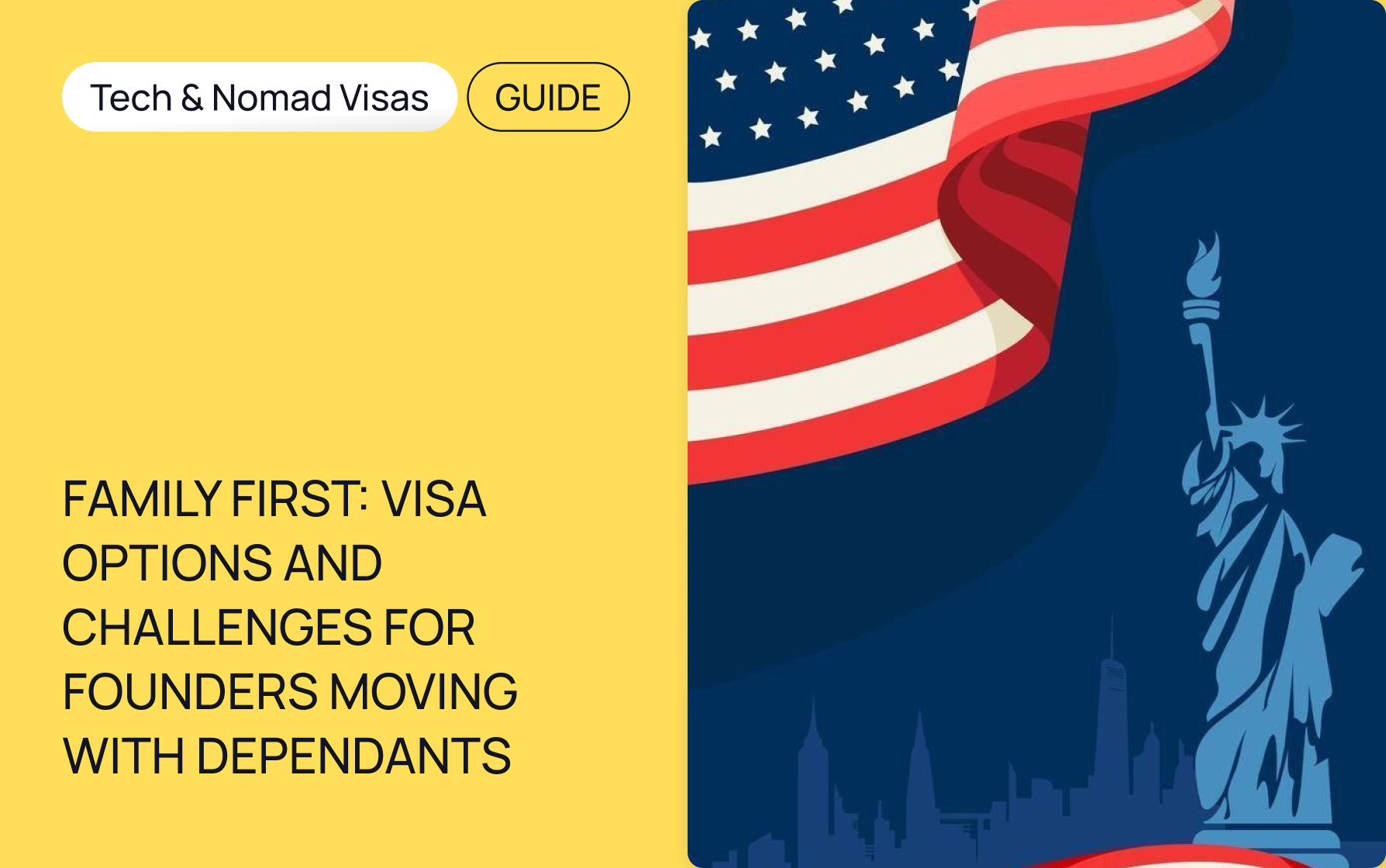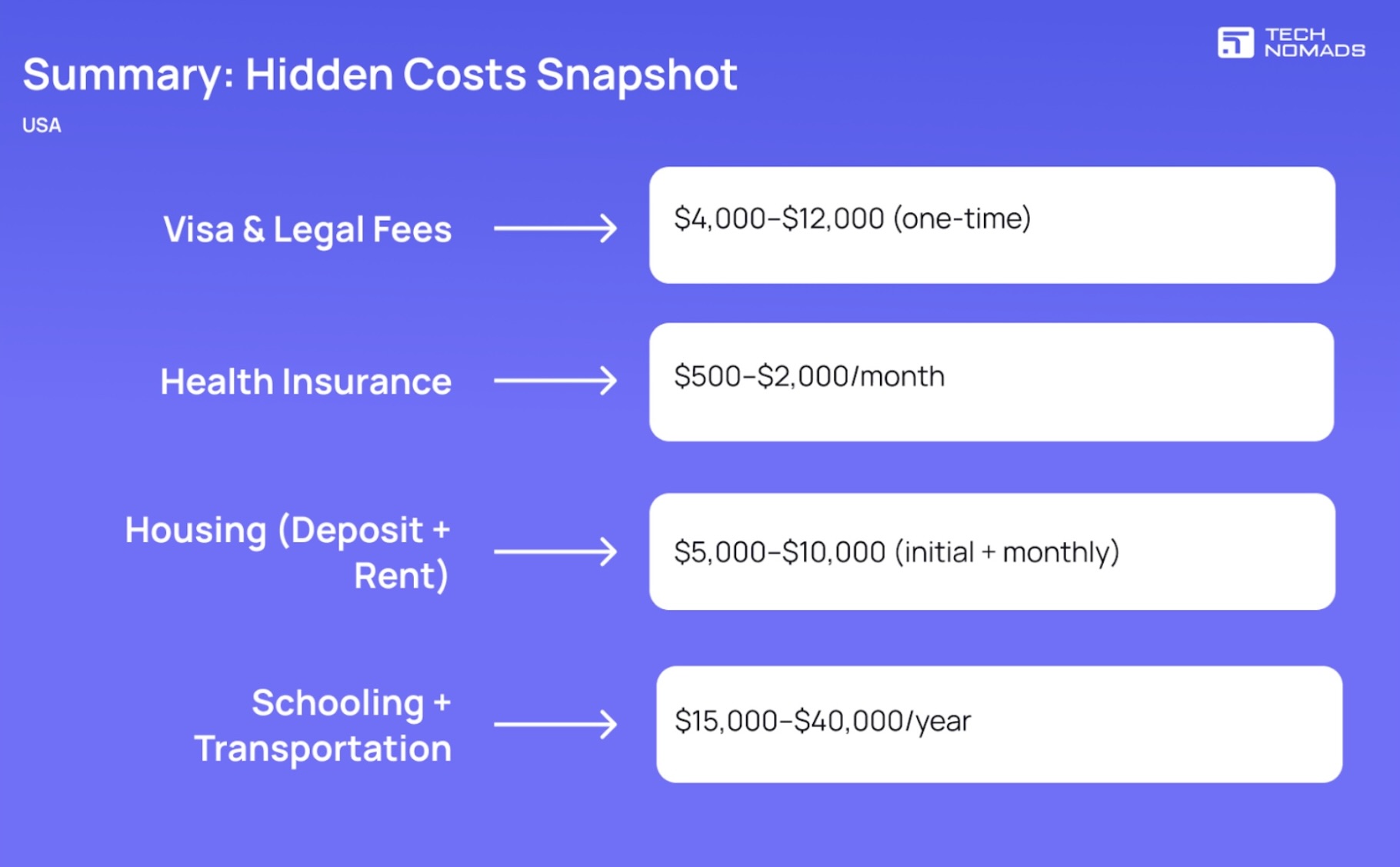
Moving to the United States as a founder or entrepreneur is an exciting milestone, full of new opportunities and possibilities. But we also know it can feel overwhelming — especially when you’re bringing your family with you. It’s not just about your visa; it’s about making sure your spouse, children, and loved ones are safe, supported, and ready to start a new chapter alongside you. That means thinking about more than paperwork — it’s about schools, healthcare, and creating a sense of stability during a big life transition.
This guide was created with founders and entrepreneurs like you in mind. We’ll walk through the most relevant visa options, share what the process looks like in practice, highlight common challenges, and, most importantly, explore how to navigate them together. From the first application to long-term plans like permanent residency, you’ll find insights designed to help you and your family move forward with confidence.
Because when you plan for your family’s needs from the very beginning, the whole journey becomes smoother. The risks and uncertainties don’t disappear — but with the right support, they become manageable. And that frees you to focus on what brought you here in the first place: building, growing, and creating in the U.S.
To get more information about this and related topics, read our previous articles:
Unlocking opportunities: How the USA O-1 Visa Supports Emerging Innovators in AI and Blockchain
Understanding the International Entrepreneur Rule (IER) and How it Compares to the O1 Visa
Navigating the New US Immigration Landscape: What Global Mobility Experts Need to Know
O-1 Visa: What’s Allowed for Your Spouse? Work, Rights, Options
O-1A Visa: Step-by-Step Guide for Tech Founders
For founders moving to the USA, selecting the right visa is crucial not only for your legal entry and stay but also to ensure your dependents—spouses and children—can accompany you and enjoy legal protections. The U.S. immigration system offers several visa categories suited for entrepreneurs, business founders, and investors. Most of these visas provide dependent visas for immediate family members, enabling them to live, study, and sometimes work in the U.S.
Below is an overview of the most common visa routes founders use in 2025, highlighting whether and how dependants are accommodated:
E-2 Treaty Investor Visa
This visa is for entrepreneurs from countries that have a treaty with the United States who invest a substantial amount of capital in a U.S. business. Dependants include the spouse and unmarried children under 21 years old. The spouse can apply for a work permit (Employment Authorization Document), allowing them to work legally in the U.S., while children can attend school but are not permitted to work.
L-1 Intracompany Transfer Visa
Designed for executives, managers, or employees being transferred to a U.S. branch, affiliate, or subsidiary of their company. Dependants—spouse and children under 21—receive L-2 visas. Spouses can obtain work authorization through an Employment Authorization Document and may work freely. Children can attend school but cannot work.
O-1 Extraordinary Ability Visa
Issued to individuals with extraordinary ability or achievement in business, sciences, arts, or education. Dependants (O-3 visa holders) include spouse and children under 21. Dependants can attend school, but neither spouses nor children are allowed to work.
H-1B Specialty Occupation Visa
For skilled workers employed by a U.S. employer in specialty occupations, which can include founders employed by their own company. Dependants (spouse and children) receive H-4 visas. Work authorization for spouses is limited and only available if the primary H-1B visa holder is in the process of obtaining a green card (has an approved I-140 petition). Children can attend school but cannot work.
EB-5 Immigrant Investor Visa
Allows investors to obtain permanent residency (a green card) by investing $800,000 or $1.05 million in a U.S. business that creates at least ten jobs. Dependants include spouse and children under 21, who also receive green cards. All family members have the right to work and study freely in the U.S.
TN Visa (for Canadian and Mexican Nationals)
For certain professionals under the USMCA (formerly NAFTA) agreement. Dependants receive TD visas. Spouses and children can attend school, but they are not authorized to work.
The Hidden Costs And Logistics Of Relocating With Dependants
Moving to the United States as a founder is complex enough—but relocating with dependants introduces a whole new layer of logistical, financial, and emotional considerations. While visa processes and legal requirements are the foundation, hidden costs and practical planning can make or break your family’s relocation experience.
Usually, there is a lot of talk about visas, but rarely about housing, schools, and medicine. However, this is often what determines how smoothly a family's move will go.
Most founders budget for their visa, but each dependent adds to the cost—sometimes significantly. Fees may include:
The U.S. healthcare system is not subsidised for non-residents, and coverage is essential.
Finding the right living environment is about more than square footage—it’s about schools, safety, and quality of life for your family.
Public transport isn’t reliable in most U.S. cities (outside NYC and a few metros). For families, a car is often essential.
Don’t underestimate the emotional and psychological load:
You’ll have to keep track of a lot of things: visas, permits, and deadlines. Missing one can cause a lot of stress:
If your U.S. business isn’t yet generating stable revenue, your family's expenses may rely on personal savings.

Relocating your business is only one piece of the puzzle. Once you arrive in the United States with your dependents, the logistical demands shift toward day-to-day stability—work, school, and maintaining a valid immigration status. For founders juggling startup momentum with family obligations, understanding how each member of the household fits into the U.S. system is essential.
Below is a breakdown of what to expect—and prepare for—across work eligibility, schooling, and ongoing visa responsibilities.
Work rights for spouses vary greatly depending on your visa type. Here’s what founders need to know:
As of 2023, L-2 and E-2 spouses are considered employment authorised incident to status—meaning no separate EAD application is required.
H-4 spouses, however, must apply for an EAD, and only if the H-1B holder has an approved I-140.
All children, regardless of immigration status, are entitled to attend public K-12 schools in the United States. These are free and zoned by residential address.
Key Considerations:
Children under age 5 are not eligible for free public schooling, and childcare in the U.S. is extremely expensive.
It’s not enough to enter the U.S. legally—you must maintain a valid status for every family member throughout your stay. Here’s what’s on your ongoing to-do list:
For Primary Visa Holders (You):
For Dependants:
Your family will also need to complete these tasks to integrate smoothly into American systems:
Relocating with dependants also means preparing for unforeseen issues, such as:
Relocating to the U.S. as a founder isn’t just about legal processes or business milestones—it’s about laying the groundwork for your entire family to feel safe, confident, and connected in a new environment. This is especially critical in the first 3–6 months after arrival, a period often marked by culture shock, logistical hurdles, and emotional adjustment.
Below are key strategies to help your dependents settle in and thrive alongside your entrepreneurial journey.
Approach the move as a shared journey, not a solo mission. Outline the process clearly for everyone, including children.
Include:
Tip: Assign roles—for example, your partner handles schools while you focus on business incorporation and legal setup.
Many founders are tempted to base their move on proximity to investors, accelerators, or business hubs—but what works for your business might not suit your family.
Consider:
Tip: Look into cities that combine startup activity with family-friendly infrastructure—Austin, Raleigh, Denver, and Seattle are increasingly popular among founder families.
Relocation affects each family member differently. Founders may feel excitement and urgency—dependants might feel dislocation, confusion, or even resentment.
Encourage open conversations around:
Tip: Keep a shared family journal or start a group photo blog—it helps children feel like active participants in the journey.
Community connection is one of the biggest predictors of a successful transition. Don’t wait until you're settled—start building a support network before the move.
Join:
Tip: Encourage your spouse to find social or professional circles early—especially if they are not working immediately.
Don’t let a medical emergency be your introduction to the U.S. system. Secure a healthcare plan and establish care providers within your first month.
Action list:
Tip: Some U.S. schools require medical exams or immunisation records before enrolment—check ahead!
Relocation often comes with unpredictable costs, and income from a new business may take time to stabilise.
Best practices:
Tip: Set up automatic alerts for key recurring costs like rent, insurance, and tuition so nothing is missed during busy periods.
For younger children, adaptation often revolves around routine and reassurance. For teens, it’s about belonging and identity.
Support ideas:
Tip: Let each child personalise their room early—familiar objects, colours, or photos ease the sense of disruption.
It’s easy to pour all your energy into your venture—but your spouse’s sense of purpose is equally important to your family’s long-term happiness.
Support options:
Tip: Discuss this openly before the move—having a personal plan can prevent identity loss or resentment.
Make the journey feel meaningful beyond the logistics. Recognise milestones together—first apartment, first day of school, first client closed—so the family stays emotionally involved in your story.
Milestone ideas:
Tip: These memories matter. They help balance the inevitable challenges with a growing sense of purpose and shared achievement.
Relocating to the United States as a founder is a bold, high-stakes move—but when you bring your family along, it becomes something far more meaningful. It’s not just about building a company; it’s about building a life—one that balances ambition with stability, and innovation with care.
Throughout this guide, we've explored the full landscape of what it means to move to the U.S. with dependents. From choosing the right visa route and understanding work and study rights, to budgeting for hidden costs and managing emotional transitions, each stage requires planning and a long-term mindset.
Some key takeaways include:
But perhaps the most important insight is this: your family’s transition is a multiplier of your success. When your partner feels empowered, your children feel settled, and your household finds its rhythm, you gain the freedom and focus to grow your venture with clarity. Stability at home enhances resilience at work.
We see that — when a family adjusts more quickly to life in a new country, the founder can step into business challenges with far greater strength and focus.
So as you draft business plans, investor decks, and market strategies, take equal care in planning your family’s roadmap. This dual focus isn’t a distraction from success; it’s the foundation of it.
After all, what’s the value of opportunity if it can’t be shared with those who matter most?
Do you find it challenging to showcase and structure your achievements for a U.S. visa application? Or perhaps you’re unsure which experiences USCIS will value most? You’re not alone — and that’s where we step in.
At Tech Nomads, we’ve been helping talents and their families relocate for many years. What we’ve learned is that success isn’t only about securing the visa but also about feeling supported and confident in those first crucial months of transition. Because in the end, it’s not only about paperwork, it’s about feeling confident, settled, and ready for what comes next.
Tech Nomads Club is a curated global community for highly skilled professionals.
We host free, application-based events including expert panel talks, start-up pitch days, members-only networking, informal meetups, and fireside conversations with industry leaders.
Membership is free but selective — open to those building across borders and seeking meaningful growth through connection, knowledge, and community.
We also produce a regular podcast, sharing real stories, insights, and voices from inside the Club.
To explore your USA relocation options, you may:
Subscribe to our social media platforms to stay up-to-date on global mobility news and opportunities: